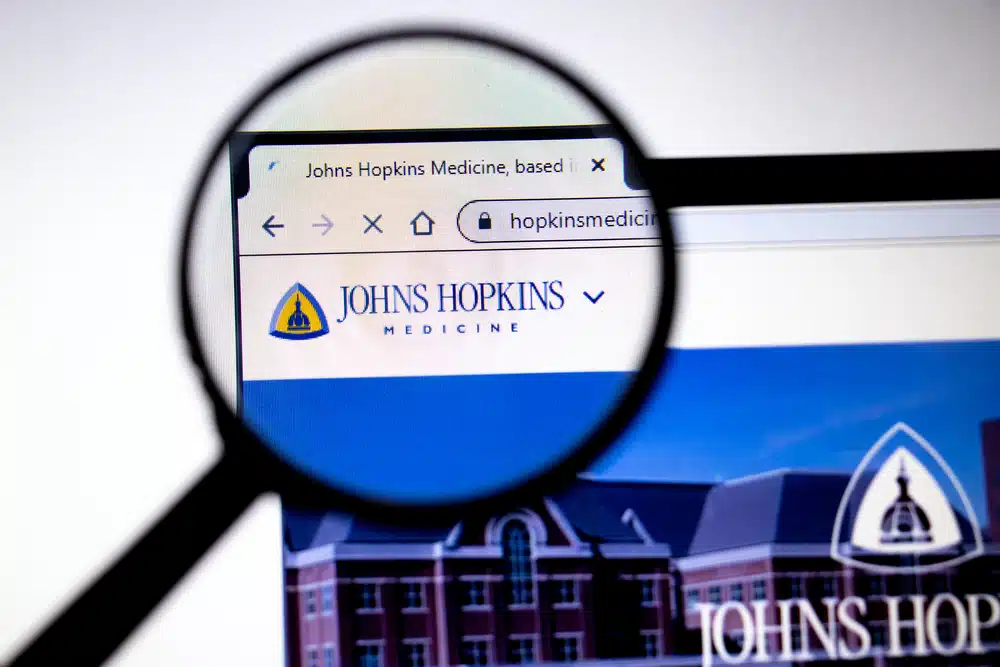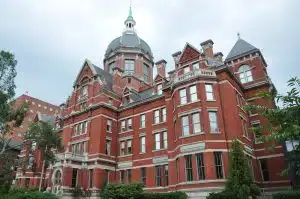Who Is The Founder Of Johns Hopkins University?
Who is the founder of Johns Hopkins University?
Who is the founder of Johns Hopkins University? Johns Hopkins, a successful businessman, and philanthropist from Baltimore, Maryland, created Johns Hopkins University.
Hopkins, who was never married and had no children, left a $7 million bequest after his death in 1873 to establish a university and hospital.
The Johns Hopkins Hospital debuted in 1889, and the Johns Hopkins University was founded in 1876.
What is Johns Hopkins University known for?
What is Johns Hopkins University known for? Johns Hopkins University is known for its expertise in many areas, as listed below by AdmissionSight. Read on to determine who is the founder of Johns Hopkins University.
Johns Hopkins University is known for the following:
- Medicine and Public Health: The Johns Hopkins University School of Medicine is one of the most esteemed medical schools in the world. The Johns Hopkins Hospital, part of the university, is often ranked as one of the best hospitals in the United States. The Bloomberg School of Public Health at the university, regarded as the best in the world, is another area in which it excels.
- Research: Johns Hopkins University is a top research institution that carries out ground-breaking studies in a variety of disciplines, including engineering, physics, astronomy, and neurology.
- Liberal Arts: The Krieger School of Arts and Sciences has a renowned department in each of the liberal arts fields, including history, philosophy, economics, and international studies.
- International Relations: With a concentration on research and training pertinent to policy, the Paul H. Nitze School of Advanced International Studies (SAIS) is one of the world’s top universities for studying international relations.
- Innovation and Entrepreneurship: The Technology Ventures office assists in founding new firms and the commercialization of technology created by university researchers. Johns Hopkins University has a strong culture of invention and entrepreneurship.
History of Johns Hopkins University
The history of Johns Hopkins University begins with finding out who is the founder of Johns Hopkins University. With a $7 million bequest left by the philanthropist Johns Hopkins after he died in 1873, Johns Hopkins University was established in 1876.
Hopkins was a successful businessman and abolitionist who made money through shipping, real estate, and other ventures. He only went to grammar school and had no formal education after that, but he strongly supported how education can change people’s lives and society as a whole.
The university’s goal was to give students a well-rounded, cross-disciplinary education that would prepare them to be leaders in a world that was changing quickly in the late 1800s. It was modeled after the great European research institutions of the time, such as the University of Berlin.
Daniel Coit Gilman, a well-known teacher, and researcher who had led the University of California, Berkeley before, was the school’s first president. Gilman was in charge of making the university’s curriculum, hiring professors, and building new buildings, like the famous red-brick Gilman Hall, now the center of the Homewood campus.
In its early years, the university focused on building a strong base in the liberal arts and sciences. However, as it grew, it became strong in many other areas, such as medicine, public health, international relations, and more.
Today, Johns Hopkins University is known all over the world. However, it still sticks to its original goals of academic excellence, interdisciplinary study, and using knowledge for the good of society.
Now that we have discussed the history of Johns Hopkins University, we will be determining who is the founder of Johns Hopkins University right after we discuss where the Johns Hopkins University campus is.
Johns Hopkins University campus
Where is Johns Hopkins University campus is located? Johns Hopkins University has many campuses in Baltimore, Maryland, and other locations in Washington, D.C., and Italy. The main campus also called the Homewood campus, is in the Charles Village neighborhood of Baltimore.
The following are some distinctive aspects of the Homewood campus:
- The Quad: The grassy area known as The Quad, which is flanked by historic red-brick buildings and is a well-liked place for students to unwind, study, and mingle, is the focal point of the Homewood campus.
- Gilman Hall: One of the most recognizable structures on campus, Gilman Hall is home to the history, political science, and philosophy departments and is named after the university’s first president, Daniel Coit Gilman.
- Mason Hall: The Whiting School of Engineering, one of the best engineering schools in the nation, is housed in this structure.
- Brody Learning Commons: The Brody Learning Commons, a cutting-edge library and study facility that opened in 2012, has plenty of natural light, collaborative workstations, and digital resources.
- Shriver Hall: During the year, this concert venue presents a variety of musical events, including classical, jazz, and world music.
- The Beach: The Beach is an outdoor meeting area with sand, Adirondack chairs, and umbrellas that is a favorite hangout for students.
The Homewood campus is known for its beautiful buildings, lush greenery, and busy student body.
Now that we have discussed the history of Johns Hopkins University, we will be determining who is the founder of Johns Hopkins University right after we discuss where the Johns Hopkins University campus is.
Johns Hopkins University tuition fee
Johns Hopkins University tuition fee and other undergraduate fees are $58,502 per year as of the 2022–2023 academic year. Other costs like accommodation and board, textbooks, and personal expenses are not included and may differ depending on the situation.
The tuition and other costs for graduate programs at Johns Hopkins University depend on the program and institution. Graduate school fees typically vary from $1,000 to $1,500 per credit hour.
To help cover the expense of tuition, many graduate students additionally receive financial aid, scholarships, or other types of support.
It’s important to note that Johns Hopkins University has more expensive tuition than many other US schools. The university does, however, have a solid reputation for academic excellence and research, and many students and families think the investment is worthwhile.
The university also has a number of financial aid programs to help students who qualify pay for school.
Johns Hopkins University admission requirements
What are the Johns Hopkins University admission requirements? Depending on the particular program and degree level, Johns Hopkins University has different admission requirements.
The following are some general rules for admission to undergraduate and graduate programs:
Application: Students can use either the Coalition Application or the Common Application or the university’s online application system.
Standardized Tests: Candidates must submit their SAT or ACT scores and their results from two SAT Subject Tests (except for applicants who choose to submit the ACT in Writing).
Transcripts: Candidates must produce authentic transcripts from their high school and any college courses they took while still in high school.
Essays: Some majors or programs require both a personal essay and another essay from applicants.
Letters of Recommendation: Applicants must submit two letters of support from professors, guidance counselors, or other academic experts.
Interviews: Although they are not necessary, everyone applying should schedule an interview.
It’s important to remember that the entry requirements and application process can vary greatly depending on the program and degree level. Prospective students should read the requirements carefully and contact the admissions office with any questions or concerns.
Now that we have determined who is the founder of Johns Hopkins University and discussed its tuition fee and admission requirements, let’s now check to determine if getting into Johns Hopkins University is really worth it.
Is Johns Hopkins University worth it?
Is Johns Hopkins University worth it? Whether Johns Hopkins University is worthwhile depends on the needs and priorities of each person. These are some things to think about:
- Academic Excellence: Johns Hopkins University is renowned for its prestigious academic offerings, particularly in the fields of public health, engineering, and medicine. If a student is interested in these fields, a degree from Johns Hopkins could help them reach their professional goals.
- Research Opportunities: Johns Hopkins is a research-intensive institution, and students frequently have the chance to collaborate with faculty on cutting-edge studies. Students who wish to work in their area or pursue jobs in research may find this a useful experience.
- Professional Outcomes: Johns Hopkins University graduates have excellent job outcomes, with many pursuing lucrative professions in their specialties. Students should be aware of how expensive it is to go to Johns Hopkins, and they should think carefully about the return on investment for their specific degree program.
- Diversity and Inclusion: Johns Hopkins University is dedicated to promoting an inclusive and varied community and provides various tools and activities to assist students from all backgrounds. Johns Hopkins could be a good fit for students who care greatly about diversity and are open to everyone.
- Cost of Attendance: Johns Hopkins University has a high tuition fee compared to many other colleges and institutions, which can put a heavy financial burden on both students and their families. To help defray the cost of attendance for eligible students, the university offers various financial aid options.
In conclusion, the value of Johns Hopkins University depends on the priorities and circumstances of each person. Before making their choice, prospective students should seriously consider the academic programs, research possibilities, professional prospects, diversity and inclusiveness, and cost of attendance.
Knowing who is the founder of Johns Hopkins University will make you want to know more details about the university and even want to be admitted! Let our academic counseling service be your guide.
You may need assistance enrolling at Johns Hopkins now that you know the university’s admissions requirements. Your test scores, extracurricular involvement, and essays all greatly impact your chances of getting into the college of your choice.
At AdmissionSight, the world’s leading Ivy League and college admissions consulting company, we can help you get a better chance to be at your dream school.
In AdmissionSight, our college admission experts will provide the necessary guidance every step of the way. You can get assistance to get into the college of your choice.
In order to help you plan your entire college career and ensure you get accepted to the college of your choice, AdmissionSight will evaluate your academic and extracurricular profile and give you a roadmap.
We will also be able to help you maintain your academic direction and competence so that you won’t simply rely on athletic scholarships.
AdmissionSight is the world’s leading Ivy League and college admission consulting company. You may obtain all the necessary advice from the team by making an appointment. Book your consultation today!








































